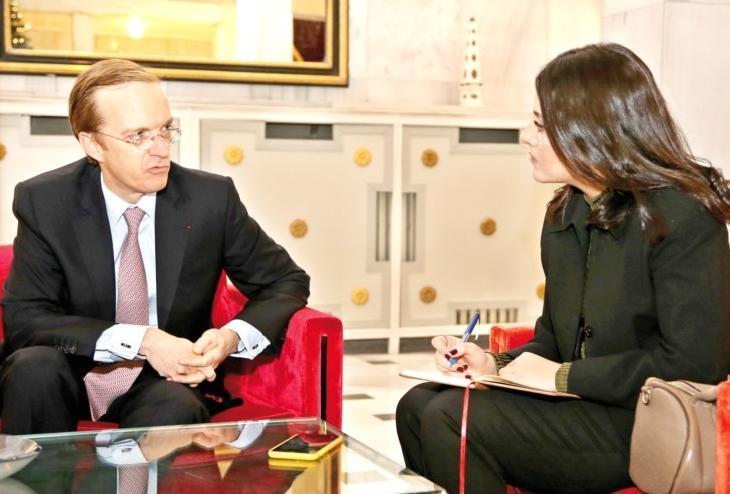
(Photo: Haşim Kılıç)
Despite having political differences, Turkey and France have many connections, especially in the cultural area, according to the French ambassador to Ankara.
“In the past, you’ve always had political differences at [former French president Nicolas] Sarkozy’s time, [Jacques] Chirac’s time. It’s life. But I think the important message here is that what unites us is much more important than what can divide us sometimes,” Ambassador Charles Fries told Hürriyet Daily News on Dec. 4.
The ambassador’s remarks came before a concert at the French Embassy in Ankara, where gifted young musicians, part of renowned twin pianists Güher and Süher Pekinel’s “Young Musicians on World Stage” project, enthralled the audience.
The project provides scholarships to young artists for their education in the best music schools all around the world.
“This concert is a little bit my idea if I may say that. I said, ‘Here, I have a very nice place, you can come with some young musicians and I would be happy as a French ambassador to host this concert’,” he said.
“Because in general, when we have concerts, we have famous French artists. But [for] the first time, I wanted Turkish musicians to play here in order to show that there are links, bridges between France and Turkey and of course, Europe,” he added.
Fries said that for young artists, who are scholarship students of the project, to study abroad in European countries demonstrates the connections between Turkey and Europe.
“I think these links between France, Germany, Britain and Turkey in the area of musical education is very interesting. That’s why I wanted to promote this because there are many links between France and Turkey particularly in the cultural area. I think that concerts help to show that there are connections between our two countries,” he said.
Not limited to music
Nevertheless, the cultural connections are not limited to music, the ambassador said, giving the example of curator and art critic Nicolas Bourriaud, who curated the 16th Istanbul Biennial in 2019.
“Even if sometimes there are some political difficulties between Turkey and European countries, we try to invest in education, in culture, in arts,” Fries said.
He also conveyed that there are nearly 4,000 Turkish students getting their education in France and French students who study in Turkey as part of the Erasmus program.
Regarding education, Fries also said that there are roughly 13,000 young people in Turkey who study in French language in schools such as the Galatasaray Lycée in Istanbul and Tevfik Fikret High School in Ankara and İzmir.
“It’s good to promote this. That’s why we try to push this in Turkey and also to promote. We would like to have more Turkish students in France for their studies,” he said.
“So, it is a good illustration of the fact that our interests are intertwined and that we try to exchange, particularly between young people,” he added.
The ambassador also underlined that Turkey and France have deep historical roots as France established its first embassy during the Ottoman era, in the 16th century. He added that the countries also have many economic relations as there are over 450 French companies based in Turkey.
“My job is to connect societies, people, governments. Despite some difficulties sometimes, I think we have very strong interests, and there is this friendship between our two countries,” Fries said.
“I think that is my main message to show that there are interconnections, especially in the music area,” he added.
When asked about how Turkey can improve itself in the field of musical education, Fries said that early education would be the priority.
“Because everything starts when you are young. So, if you want to deal with a problem, you have to deal with it at the earliest stage as possible,” he said.
He also praised the Pekinel sisters’ projects, saying the initiatives help to promote education.
“What we need, and this is the same problem in France, we need to push scientific teaching, of course, sciences, technology and also arts and culture,” he said.
Fries also stressed that a generation without common knowledge is a “lost” one.